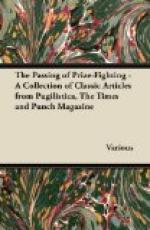* * * * *
Miss MARGARET PETERSON’s Fate and the Watcher (HURST AND BLACKETT) was already reminding me strongly of The Broken Road when I found that one of her characters had been struck by this same idea: “Lady Daring was not easy in mind, remembering the look in Prince Channa’s eyes the evening of the ball. She had a vague memory of a novel by Mason that she had once read which dealt more or less with the same situation.” This naïve admission must be my excuse for making odious comparisons between the two books and saying that Mr. MASON’S novel, which also treats of a native prince’s love for an English girl, is on bigger and broader lines. In Fate and the Watcher the heroine and the cause of all the trouble is a waif taken literally from the gutter. She develops into a most unscrupulous minx, and, although we are led to suppose that her defects of character were largely due to her origin, I am prepared to allot to Sir Henry and Lady Daring, who adopted her, their fair share in the blame. A girl of the sweet type, endowed liberally with virtues, is produced as an antidote to the minx, but is no match for her. The present is not perhaps the most happily chosen time for a novel with such a theme, but I can at least say that Miss PETERSON is an expert in her subject and is never at a loss for incident. And Ruth (if that will console you) pays full price for her sins.
* * * * *
Mr. HERBERT VIVIAN is the complete partisan. He will believe always the worst of an enemy, the best of a friend—a credulous loyal fellow. And in Italy at War (DENT) he sets out to tell us a good deal that is interesting about the fine feats of our Italian Allies, especially of those Titanic gymnasts, the heaven-scaling Alpini. It is fair to warn the reader that it is a rather desultory scrap-book of the type the War has made common; fair also to add that some of the chapters least connected with the War are exceedingly interesting, as that about the elaborate sport of pigeon-netting at Cava dei Terreni. What I like least about our ready author is his fatuous little jokes, such as “Noli remained a sovereign republic for centuries ... had her own bishopric (hence the phrase ’Noli episcopari’)”; or, “Briand came to Rome the other day with much brio.” And inconsequences like this: “One of Disraeli’s heroes discovered two nations: the rich and the poor. In a similar spirit General February may be said to command two distinct armies.” All the same, an interesting book.




